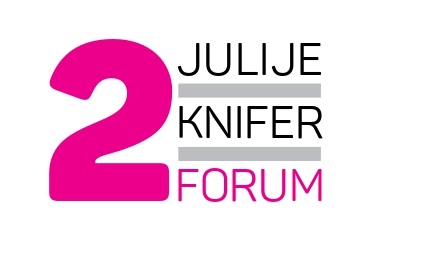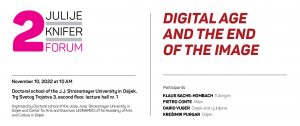Doctoral School of the J.J. Strossmayer University in Osijek, Trg Svetog Trojstva 3, second floor, lecture hall no. 1
November 10, 2022 at 10 AM
Organizers: Doctoral School of Josip Juraj Strossmayer University in Osijek and Center for Arts and Sciences LEONARDO of the Academy of Arts and Culture in Osijek
After the 1st Julije Knifer Forum, held in November 2020 and the lectures of top world theorists (W.J.T. Mitchell, Emmanuel Alloa, Marco Senaldi) who tried to answer the question “how does art concern us?”, also the second edition of this scientific school puts in the center of interest globally relevant problems of culture, art and society. This time, the central theme is organized around life in the age of digital technology and its creation and presentation of visual experiences on the one hand, the status of pictorial re-presentation on the other, and the concept of realism on the third. The lectures, round table and discussion will examine our current time as an era of transition from the world of images to the world of virtual experiences, immersion and parallel realities.
The second edition of the scientific school Julije Knifer Forum would like to introduce the students of the Doctoral School of the University of J.J. Strossmayer and the wider Croatian public with the influence of digital technologies on visual arts, media and visual-performative practices. Also, we want to discuss the role of humanistic reflection of the world in conjunction with the digital technosphere. Finally, we want to draw attention to those aspects of technology that today we consider almost a natural fact of the world we live in, and which decisively affect people’s everyday life. Are we even able to distinguish reality from imagination, the physical world from virtual representations, immersive visualizations from classic images? We strive to find answers to questions that go far beyond academic discussions and concern literally each of us, affecting our experience of the world and the responsibility we have towards it and ourselves. The goal of this year’s Forum is to show how digital technologies contribute to creativity in art, but also how they deprive the traditional role of the hand and physical touch in the creation of works of art. Also, we want to open spaces of cooperation between old, new and the latest technologies of visual reproduction and stand up for the central role of the humanist worldview in the digital age. Julije Knifer Forum has the main goal of sensitizing the young, primarily student population, to the need to develop their own well-founded attitudes when observing and interpreting the phenomenon of visual culture. This means pointing out the necessary difference between canonically established values and those that each of us arrives at by activating personal, learned and adopted critical methods. Contemporary visual arts have always represented the greatest challenge to understanding, but not because they are incomprehensible in themselves, but because of the dominance of outdated paradigms of interpretation. This project is cognitive and enlightening in nature; in direct contact with the audience, expert lecturers will point out new ways of observing, experiencing and interpreting contemporary visual phenomena.
Participating:
KLAUS SACHS-HOMBACH, University of Tübingen
Realism and Photography
The expression “realism” should be understood as an umbrella term: as a semantically very colorful collective term, which has been understood very differently in different disciplines, at different times and also by different actors. In order to get a proper understanding of the term “realism” and its various problems, I would first like to distinguish different concepts of realism. In a second step, I will discuss in more detail some specific problems of photographic realism. A final, third step will be devoted to the ethical implications that result in particular from the thesis of a fundamental ambivalence in photographic representation.
PIETRO CONTE, University of Milano
Uncut? Frames and the iconic difference in immersive (virtual) environments
The rapid pace of technological advancements in the production of immersive digital worlds is often associated with a dominant narrative according to which virtual reality would convey the impression of total illusion and absolute immediacy. This goes hand in hand with the statement that the traditional dispositive of the frame, which ensures the island-like nature of the image world and its separateness from the observer, would be definitely (and finally) gone. In my talk, I aim to put this whole conception into question. After sketching out the concept of “unframedness” by clarifying what it is meant to account for, I will show why, and in which sense, the notion of the frame still applies to immersive virtual worlds and should be retained in order to avoid misunderstandings in how we define immersiveness.
DARIO VUGER, University of Osijek and Ljubljana
Image as philosophy and phenomenon
The lecture will explore the role of the image as a concept in contemporary philosophy. While we speak today of groundbreaking shifts in our transitioning from the thrownness in the material world towards the immersion in the immaterial space, we must take a conceptual precaution with respect to the fact that we are still and only talking about images, our conceptual pictures of the state of our world, world-pictures and spectacles. Supplementing real communication with “social relation mediated by images” means that we talk in pictures in more than one sense. We will explore this issue through a historical development of the use of the concept of the image in philosophy of the first half of the twentieth century onwards and through the spectacles of today. The image, left on the sideways of contemporary art finds new life in existential phenomenology and its radical quest of overcoming philosophy in order to bring us closer to the ideal of the examined life as well as the comprehensive critique of the singularity of digital phenomena.


